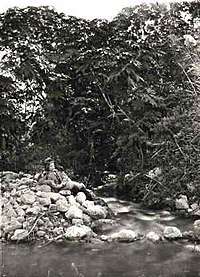Claude Reignier Conder
Claude Reignier Conder (29 December 1848, Cheltenham – 16 February 1910, Cheltenham) was an English soldier, explorer and antiquarian. He was a great-great-grandson of Louis-François Roubiliac[1][2] and grandson of editor and author Josiah Conder.[3]

Conder was educated at University College London and the Royal Military Academy, Woolwich. He became a lieutenant in the Corps of Royal Engineers in 1870. He carried out survey work in Palestine in 1872–1874, latterly in conjunction with Lt Kitchener, later Lord Kitchener,[4] whom he had met at school,[2][5] and was seconded to the Palestine Exploration Fund from 1875 to 1878 and again in 1881 and 1882, when he was promoted captain. He retired with the rank of colonel in 1904.[6]
Conder joined the expedition to Egypt in 1882, under Sir Garnet Wolseley, to suppress the rebellion of Arabi Pasha. He was appointed a deputy assistant adjutant and quartermaster-general on the staff of the intelligence department. In Egypt his perfect knowledge of Arabic and of Eastern people proved most useful. He was present at the action of Kassassin, the Battle of Tel el-Kebir, and the advance to Cairo, but then, seized with typhoid fever, he was invalided home. For his services he received the war medal with clasp for Tel el-Kebir, the Khedive's bronze star and the fourth class of the Order of the Medjidie.
While surveying the area of Safed in July 1875, Conder and his party were attacked by local residents and Conder sustained a serious head injury which left him bedridden for a while and unable to return to Palestine.[7] The work of surveying the country of Palestine commenced again only in late February 1877, without Conder.[8]
Publications
- 1878: Tent Work in Palestine ISBN 1-4179-2238-9
- 1879: Judas Maccabæus, and the Jewish War of Independence
- 1880: Memoires: The Survey of Western and Eastern Palestine ISBN 1-85207-835-9
- 1883: Heth and Moab, Explorations in Syria in 1881 and 1882
- 1886: Syrian Stone-lore, Or, The Monumental History of Palestine
- 1887: Altaic Hieroglyphs and Hittite Inscriptions ISBN 1-4326-0939-4
- 1889: Palestine
- 1889: The Survey of Eastern Palestine, Memoirs of the Topography, Orography, Hydrography, Archaeology, Etc.
- 1893: The Tell Amarna Tablets
- 1896: The Bible and the East
- 1897: The Latin Kingdom of Jerusalem
- 1898: The Hittites and their Language
- 1900: The Hebrew Tragedy
- 1902: The First Bible
- 1909: The City of Jerusalem
Books, freely available
- Conder, Claude Reignier (1879) Tent Work in Palestine, vol 1
- Conder, Claude Reignier (1879) Tent Work in Palestine, vol 2
- Conder, Claude Reignier and H.H. Kitchener (1881): The Survey of Western Palestine: memoirs of the topography, orography, hydrography, and archaeology. London:Committee of the Palestine Exploration Fund. vol 1 The full text, archive.org, Can download PDF.
- Conder, Claude Reignier and H.H. Kitchener (1881): The Survey of Western Palestine: memoirs of the topography, orography, hydrography, and archaeology. London:Committee of the Palestine Exploration Fund. vol 2 The full text, archive.org, Can download PDF.
- Conder, Claude Reignier and H.H. Kitchener (1881): The Survey of Western Palestine: memoirs of the topography, orography, hydrography, and archaeology. London:Committee of the Palestine Exploration Fund. vol 3 The full text, archive.org, Can download PDF.
- Conder, Claude Reignier (1885), Heth and Moab : explorations in Syria in 1882, archive.org
- Conder, Claude Reignier (1887), Syrian Stone-Lore; Or, the Monumental History of Palestine, archive.org
- Conder, Claude Reignier (1887), Altaic Hieroglyphs and Hittite Inscriptions, archive.org
- Conder, Claude Reignier (1889), Altaic Hieroglyphs and Hittite Inscriptions, archive.org
References
- William Thomas Whitley (1928). Artists and their friends in England, 1700–1799, Volume 1. The Medici society. p. 93.
- John Charles Pollock (1998). Kitchener: the road to Omdurman. Constable. p. 23. ISBN 0-09-479140-6.
- Claude Reignier Conder at Mitchell Families Online, access date 15 December 2019
- Stewart Howe, Kathleen (1997). Revealing the Holy Land: the photographic exploration of Palestine. University of California Press. pp. 37–38. ISBN 0-89951-095-7.
- British Empire. Kitchener
- "CONDER, Claude Reignier". Who's Who. Vol. 59. 1907. p. 371.
- H.H. Kitchener, An Account of the Safed Attack, Palestine Exploration Quarterly Statement 7.4 (Oct. 1875), pp. 195–199
- H.H. Kitchener, Survey of Galilee,Palestine Exploration Quarterly Statement (1878), pp. 159–174.
- Moscrop, John James (2000). Measuring Jerusalem: the Palestine Exploration Fund and British interests in the Holy Land. Continuum International Publishing Group. pp. 98–99. ISBN 0-7185-0220-5.
- Yadin, Yigael (1977). Masada. La fortaleza de Herodes y el último bastión de los Zelotes. Barcelona: Ediciones Destino. ISBN 84-233-0537-6.
External links
| Wikimedia Commons has media related to Claude Reignier Conder. |

- Works by Claude Reignier Conder at Project Gutenberg
- Works by or about Claude Reignier Conder at Internet Archive
- Profile at PEF website
- Claude Reignier Conder at Find a Grave